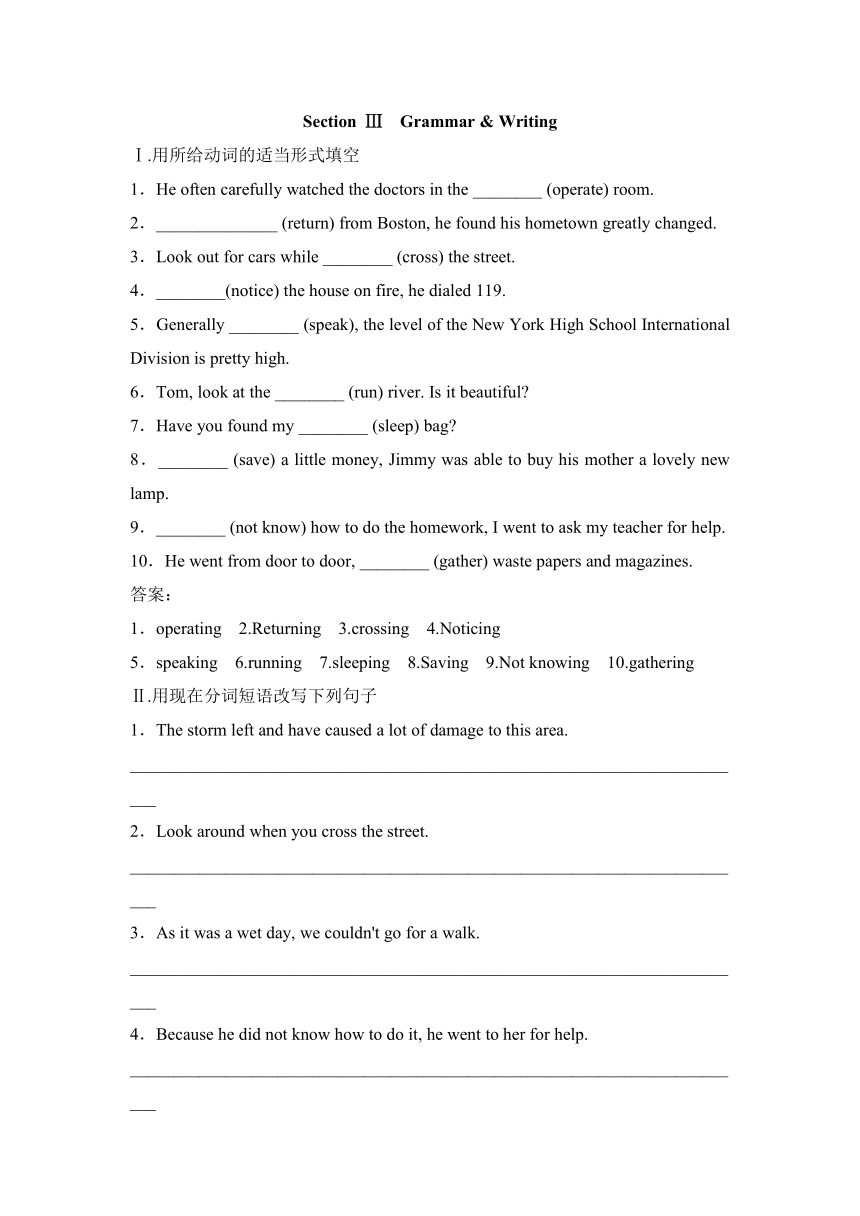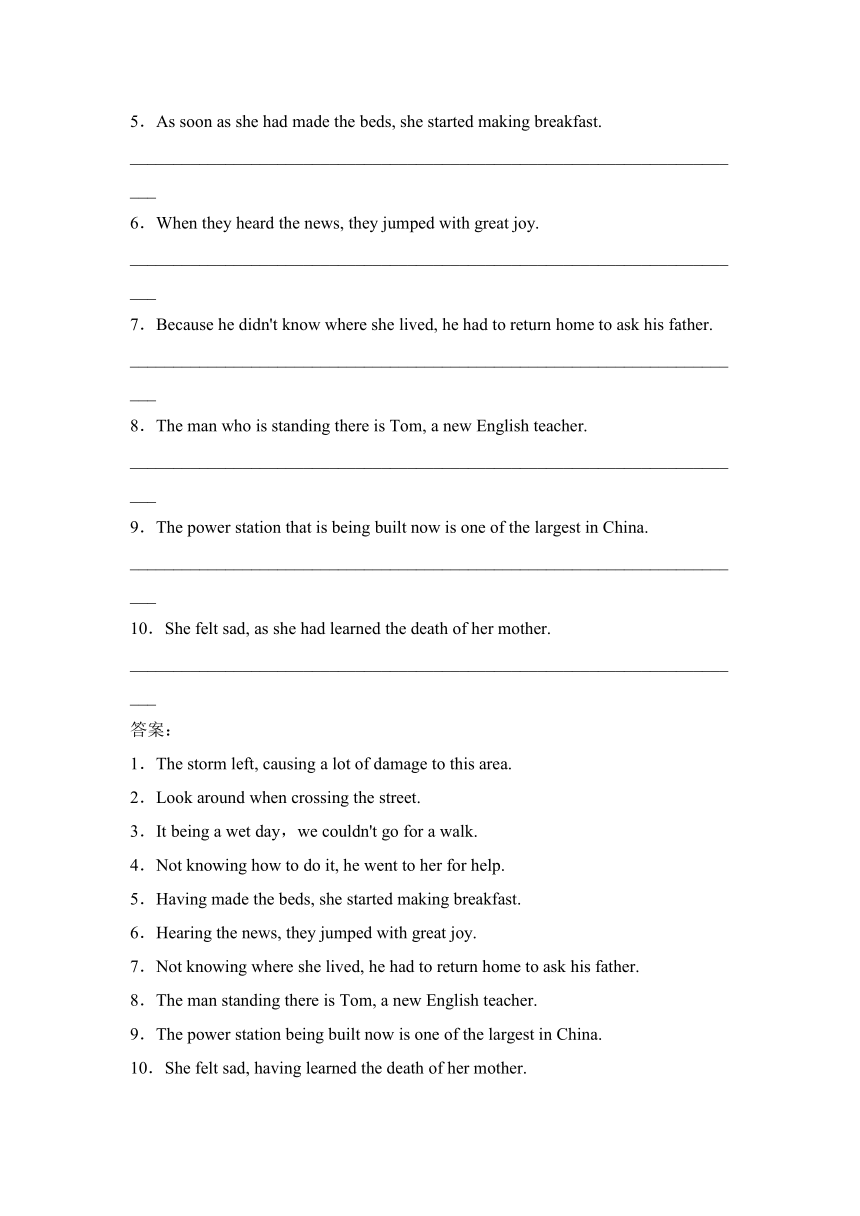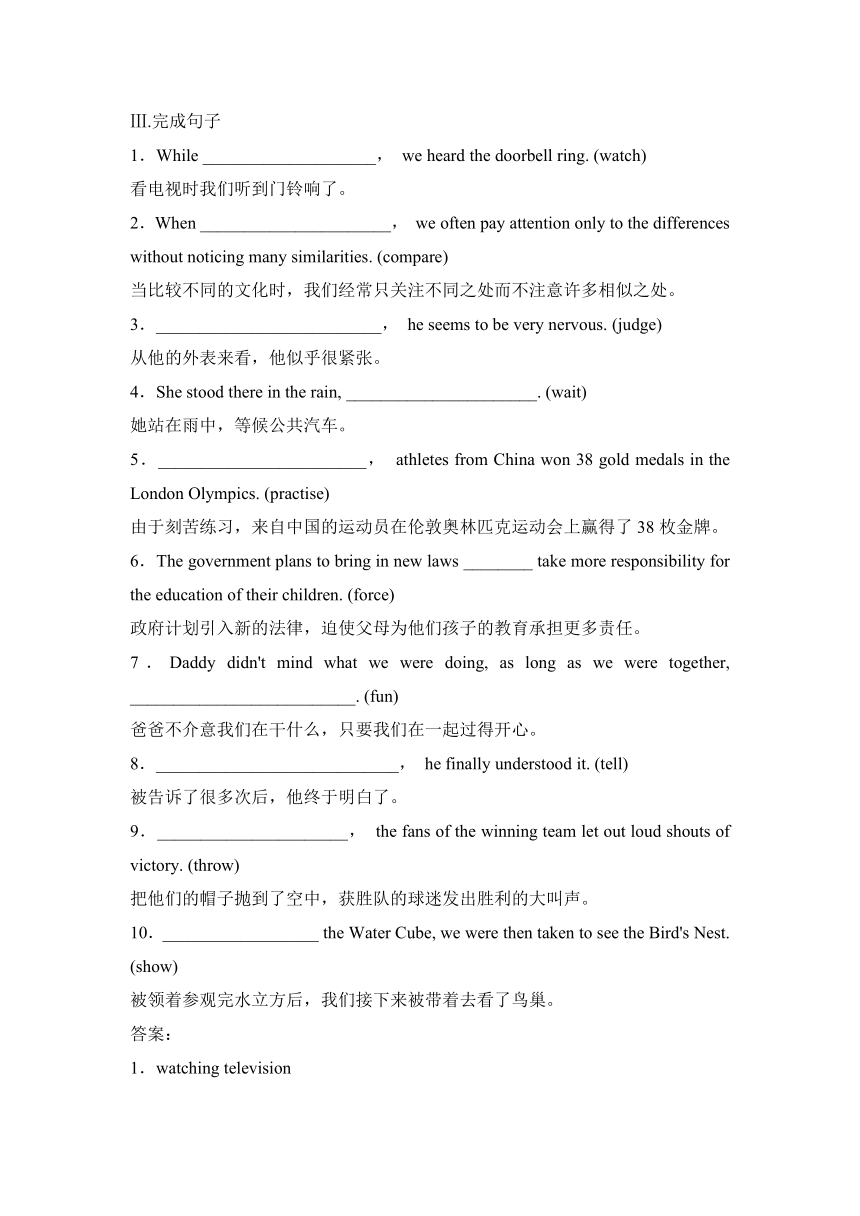2015-2016学年高中英语必修4 Unit 4 Body language Grammar & Writing练习(含答案解析)
文档属性
| 名称 | 2015-2016学年高中英语必修4 Unit 4 Body language Grammar & Writing练习(含答案解析) |  | |
| 格式 | zip | ||
| 文件大小 | 16.7KB | ||
| 资源类型 | 教案 | ||
| 版本资源 | 人教版(新课程标准) | ||
| 科目 | 英语 | ||
| 更新时间 | 2016-04-16 20:36:31 | ||
图片预览



文档简介
Section Ⅲ Grammar & Writing
Ⅰ.用所给动词的适当形式填空
1.He often carefully watched the doctors in the ________ (operate) room.
2.______________ (return) from Boston, he found his hometown greatly changed.
3.Look out for cars while ________ (cross) the street.
4.________(notice) the house on fire, he dialed 119.
5.Generally ________ (speak), the level of the New York High School International Division is pretty high.
6.Tom, look at the ________ (run) river. Is it beautiful
7.Have you found my ________ (sleep) bag
8.________ (save) a little money, Jimmy was able to buy his mother a lovely new lamp.
9.________ (not know) how to do the homework, I went to ask my teacher for help.
10.He went from door to door, ________ (gather) waste papers and magazines.
答案:
1.operating 2.Returning 3.crossing 4.Noticing
5.speaking 6.running 7.sleeping 8.Saving 9.Not knowing 10.gathering
Ⅱ.用现在分词短语改写下列句子
1.The storm left and have caused a lot of damage to this area.
________________________________________________________________________
2.Look around when you cross the street.
________________________________________________________________________
3.As it was a wet day, we couldn't go for a walk.
________________________________________________________________________
4.Because he did not know how to do it, he went to her for help.
________________________________________________________________________
5.As soon as she had made the beds, she started making breakfast.
________________________________________________________________________
6.When they heard the news, they jumped with great joy.
________________________________________________________________________
7.Because he didn't know where she lived, he had to return home to ask his father.
________________________________________________________________________
8.The man who is standing there is Tom, a new English teacher.
________________________________________________________________________
9.The power station that is being built now is one of the largest in China.
________________________________________________________________________
10.She felt sad, as she had learned the death of her mother.
________________________________________________________________________
答案:
1.The storm left, causing a lot of damage to this area.
2.Look around when crossing the street.
3.It being a wet day,we couldn't go for a walk.
4.Not knowing how to do it, he went to her for help.
5.Having made the beds, she started making breakfast.
6.Hearing the news, they jumped with great joy.
7.Not knowing where she lived, he had to return home to ask his father.
8.The man standing there is Tom, a new English teacher.
9.The power station being built now is one of the largest in China.
10.She felt sad, having learned the death of her mother.
Ⅲ.完成句子
1.While ____________________, we heard the doorbell ring. (watch)
看电视时我们听到门铃响了。
2.When ______________________, we often pay attention only to the differences without noticing many similarities. (compare)
当比较不同的文化时,我们经常只关注不同之处而不注意许多相似之处。
3.__________________________, he seems to be very nervous. (judge)
从他的外表来看,他似乎很紧张。
4.She stood there in the rain, ______________________. (wait)
她站在雨中,等候公共汽车。
5.________________________, athletes from China won 38 gold medals in the London Olympics. (practise)
由于刻苦练习,来自中国的运动员在伦敦奥林匹克运动会上赢得了38枚金牌。
6.The government plans to bring in new laws ________ take more responsibility for the education of their children. (force)
政府计划引入新的法律,迫使父母为他们孩子的教育承担更多责任。
7.Daddy didn't mind what we were doing, as long as we were together, __________________________. (fun)
爸爸不介意我们在干什么,只要我们在一起过得开心。
8.____________________________, he finally understood it. (tell)
被告诉了很多次后,他终于明白了。
9.______________________, the fans of the winning team let out loud shouts of victory. (throw)
把他们的帽子抛到了空中,获胜队的球迷发出胜利的大叫声。
10.__________________ the Water Cube, we were then taken to see the Bird's Nest. (show)
被领着参观完水立方后,我们接下来被带着去看了鸟巢。
答案:
1.watching television
2.comparing different cultures
3.Judging from/by his appearance
4.waiting for the bus
5.Having practised hard
6.forcing parents to
7.having fun
8.Having been told many times
9.Throwing their hats into the air
10.Having been shown around
Ⅳ.语法填空
Paul Lucas can often be seen walking around the city of San Francisco. Sometimes people are surprised to see him walking __1__ any shoes or socks, __2__ Lucas doesn't mind at all. __3__ likes to walk barefoot(赤脚), and so do 640 other members of Dirty Sole Society, the club that Lucas __4__(start) years ago. Lucas' idea for this is to encourage others to live __5__(free)—free of shoes.
According to Lucas, the barefoot life has many advantages. __6__ most important is simply that it feels good. He also says __7__ walking barefoot allows you to experience the world directly by touching it with your feet. In addition, the feet do not smell so much __8__ they stay dry, __9__(make) it hard for bacteria(细菌) to grow. And, of course, walking barefoot keeps your feet in good shape, so it's actually __10__(healthy) than wearing shoes.
答案:1.without 2.but/which 3.He 4.started 5.freely 6.The 7.that 8.because 9.making 10.healthier
Ⅴ.阅读理解
There is one language that is used in every country in the world. The people who use it are young and old, short and tall, thin and fat. It is everybody's second language. It is easy to understand, although you can't hear it. It is sign language.
When you wave to a friend who is across the street, you are using sign language. When you smile at someone, you are saying, “I want to be friendly”, but you are not using speech. You are using sign language. When you raise your hand in class, you are saying, “Please ask me. I think I know the correct answer.”
Babies who can't talk can point at things. They are using sign language. A policeman who wants to stop traffic holds up his hands. He is using sign language.
Many years ago, a French priest, Charles Michel de Epee, became interested in education for deaf people. He invented a finger alphabet (字母表). It is still in use. People can make the sign for letters and spell words with their hands, and deaf people can read and understand them. Soon there were schools for the deaf in many countries. The only university for the deaf is Gallaudet College in Washington D.C..
Today, in the United States, there are special TV news programs for deaf people. The newsreader tells the news in sign language. At the same time, the words appear on the TV screen.
The actors in the Theatre of Deaf don't spell every word. Sometimes they use hand signs. When they put two hands together, it means sandwich. They can make a roof with their hands when they want to show a house. One finger in front of an actor's mouth can mean quiet. You can talk to people who are behind windows that are closed. And when you go swimming with your friends, you can have conversations under water.
How many hand signs do you use every day
1.Which of the following about sign language is TRUE
A. It is a special language used in a few countries in the world.
B. It is a way to express one's ideas without words.
C. It is only used by the deaf.
D. It can be heard.
2.If you want to express the idea that “I am very friendly” to someone, you will ________.
A. raise your hand
B. put one hand onto the other
C. smile to the person
D. make a roof with your hands
3.Which of the following is TRUE according to the passage
A. Hand signs instead of finger signs are used every day.
B. There are schools, colleges and universities for the deaf in the USA.
C. The French priest Charles invented sign language.
D. Even babies are using sign language.
4.The passage is mainly about ________.
A. an introduction to sign language
B. the importance of sign language
C. a famous priest in France
D. how to use sign language
答案与解析:
1.解析:细节理解题。根据第一段可排除A、D两项;根据第二、三、四段可排除C项。
答案:B
2.解析:细节理解题。根据第二段“When you smile at someone, you are saying, ‘I want to be friendly’, but you are not using speech.”可知,应选C。
答案:C
3.解析:细节理解题。根据第三段“Babies who can't talk can point at things. They are using sign language.”可知D项正确。法国牧师Charles发明了手指字母表而不是手势语。
答案:D
4.解析:主旨大意题。文章前三段介绍了手势语在生活中的运用,后一部分介绍了聋哑人使用的手势语,B、C、D三项都太片面,故选A。
答案:A
Ⅵ.短文改错
When Jack bowed to someone, he always did much too quickly. You needn't wait any longer after he finished nod his head. So he was blamed for no manner. One day a warmhearted man has taught him, “When you bow to somebody next time, you can count January, February, March, until December. Then you could lift your body up. Thus the ceremony will be very perfect.”
The next day, he met his uncle. He did as the men told. The bow was too long that it made his uncle escape away soon with a surprising look. When Jack looked down, he found his uncle gone. So he asked the passers-by, “In what month did he go away?”
答案:
When Jack bowed to someone, he always did much too quickly. You needn't wait any longer after he finished his head. So he was blamed for no . One day a warmhearted man
taught him, “When you bow to somebody next time, you can count January, February, March, until December. Then you could lift your body up. the ceremony will be very perfect.”
The next day, he met his uncle. He did as the told. The bow was long that it made his uncle escape away soon with a look. When Jack looked , he found his uncle gone. So he asked the passers-by, “In month did he go away?”
Ⅰ.用所给动词的适当形式填空
1.He often carefully watched the doctors in the ________ (operate) room.
2.______________ (return) from Boston, he found his hometown greatly changed.
3.Look out for cars while ________ (cross) the street.
4.________(notice) the house on fire, he dialed 119.
5.Generally ________ (speak), the level of the New York High School International Division is pretty high.
6.Tom, look at the ________ (run) river. Is it beautiful
7.Have you found my ________ (sleep) bag
8.________ (save) a little money, Jimmy was able to buy his mother a lovely new lamp.
9.________ (not know) how to do the homework, I went to ask my teacher for help.
10.He went from door to door, ________ (gather) waste papers and magazines.
答案:
1.operating 2.Returning 3.crossing 4.Noticing
5.speaking 6.running 7.sleeping 8.Saving 9.Not knowing 10.gathering
Ⅱ.用现在分词短语改写下列句子
1.The storm left and have caused a lot of damage to this area.
________________________________________________________________________
2.Look around when you cross the street.
________________________________________________________________________
3.As it was a wet day, we couldn't go for a walk.
________________________________________________________________________
4.Because he did not know how to do it, he went to her for help.
________________________________________________________________________
5.As soon as she had made the beds, she started making breakfast.
________________________________________________________________________
6.When they heard the news, they jumped with great joy.
________________________________________________________________________
7.Because he didn't know where she lived, he had to return home to ask his father.
________________________________________________________________________
8.The man who is standing there is Tom, a new English teacher.
________________________________________________________________________
9.The power station that is being built now is one of the largest in China.
________________________________________________________________________
10.She felt sad, as she had learned the death of her mother.
________________________________________________________________________
答案:
1.The storm left, causing a lot of damage to this area.
2.Look around when crossing the street.
3.It being a wet day,we couldn't go for a walk.
4.Not knowing how to do it, he went to her for help.
5.Having made the beds, she started making breakfast.
6.Hearing the news, they jumped with great joy.
7.Not knowing where she lived, he had to return home to ask his father.
8.The man standing there is Tom, a new English teacher.
9.The power station being built now is one of the largest in China.
10.She felt sad, having learned the death of her mother.
Ⅲ.完成句子
1.While ____________________, we heard the doorbell ring. (watch)
看电视时我们听到门铃响了。
2.When ______________________, we often pay attention only to the differences without noticing many similarities. (compare)
当比较不同的文化时,我们经常只关注不同之处而不注意许多相似之处。
3.__________________________, he seems to be very nervous. (judge)
从他的外表来看,他似乎很紧张。
4.She stood there in the rain, ______________________. (wait)
她站在雨中,等候公共汽车。
5.________________________, athletes from China won 38 gold medals in the London Olympics. (practise)
由于刻苦练习,来自中国的运动员在伦敦奥林匹克运动会上赢得了38枚金牌。
6.The government plans to bring in new laws ________ take more responsibility for the education of their children. (force)
政府计划引入新的法律,迫使父母为他们孩子的教育承担更多责任。
7.Daddy didn't mind what we were doing, as long as we were together, __________________________. (fun)
爸爸不介意我们在干什么,只要我们在一起过得开心。
8.____________________________, he finally understood it. (tell)
被告诉了很多次后,他终于明白了。
9.______________________, the fans of the winning team let out loud shouts of victory. (throw)
把他们的帽子抛到了空中,获胜队的球迷发出胜利的大叫声。
10.__________________ the Water Cube, we were then taken to see the Bird's Nest. (show)
被领着参观完水立方后,我们接下来被带着去看了鸟巢。
答案:
1.watching television
2.comparing different cultures
3.Judging from/by his appearance
4.waiting for the bus
5.Having practised hard
6.forcing parents to
7.having fun
8.Having been told many times
9.Throwing their hats into the air
10.Having been shown around
Ⅳ.语法填空
Paul Lucas can often be seen walking around the city of San Francisco. Sometimes people are surprised to see him walking __1__ any shoes or socks, __2__ Lucas doesn't mind at all. __3__ likes to walk barefoot(赤脚), and so do 640 other members of Dirty Sole Society, the club that Lucas __4__(start) years ago. Lucas' idea for this is to encourage others to live __5__(free)—free of shoes.
According to Lucas, the barefoot life has many advantages. __6__ most important is simply that it feels good. He also says __7__ walking barefoot allows you to experience the world directly by touching it with your feet. In addition, the feet do not smell so much __8__ they stay dry, __9__(make) it hard for bacteria(细菌) to grow. And, of course, walking barefoot keeps your feet in good shape, so it's actually __10__(healthy) than wearing shoes.
答案:1.without 2.but/which 3.He 4.started 5.freely 6.The 7.that 8.because 9.making 10.healthier
Ⅴ.阅读理解
There is one language that is used in every country in the world. The people who use it are young and old, short and tall, thin and fat. It is everybody's second language. It is easy to understand, although you can't hear it. It is sign language.
When you wave to a friend who is across the street, you are using sign language. When you smile at someone, you are saying, “I want to be friendly”, but you are not using speech. You are using sign language. When you raise your hand in class, you are saying, “Please ask me. I think I know the correct answer.”
Babies who can't talk can point at things. They are using sign language. A policeman who wants to stop traffic holds up his hands. He is using sign language.
Many years ago, a French priest, Charles Michel de Epee, became interested in education for deaf people. He invented a finger alphabet (字母表). It is still in use. People can make the sign for letters and spell words with their hands, and deaf people can read and understand them. Soon there were schools for the deaf in many countries. The only university for the deaf is Gallaudet College in Washington D.C..
Today, in the United States, there are special TV news programs for deaf people. The newsreader tells the news in sign language. At the same time, the words appear on the TV screen.
The actors in the Theatre of Deaf don't spell every word. Sometimes they use hand signs. When they put two hands together, it means sandwich. They can make a roof with their hands when they want to show a house. One finger in front of an actor's mouth can mean quiet. You can talk to people who are behind windows that are closed. And when you go swimming with your friends, you can have conversations under water.
How many hand signs do you use every day
1.Which of the following about sign language is TRUE
A. It is a special language used in a few countries in the world.
B. It is a way to express one's ideas without words.
C. It is only used by the deaf.
D. It can be heard.
2.If you want to express the idea that “I am very friendly” to someone, you will ________.
A. raise your hand
B. put one hand onto the other
C. smile to the person
D. make a roof with your hands
3.Which of the following is TRUE according to the passage
A. Hand signs instead of finger signs are used every day.
B. There are schools, colleges and universities for the deaf in the USA.
C. The French priest Charles invented sign language.
D. Even babies are using sign language.
4.The passage is mainly about ________.
A. an introduction to sign language
B. the importance of sign language
C. a famous priest in France
D. how to use sign language
答案与解析:
1.解析:细节理解题。根据第一段可排除A、D两项;根据第二、三、四段可排除C项。
答案:B
2.解析:细节理解题。根据第二段“When you smile at someone, you are saying, ‘I want to be friendly’, but you are not using speech.”可知,应选C。
答案:C
3.解析:细节理解题。根据第三段“Babies who can't talk can point at things. They are using sign language.”可知D项正确。法国牧师Charles发明了手指字母表而不是手势语。
答案:D
4.解析:主旨大意题。文章前三段介绍了手势语在生活中的运用,后一部分介绍了聋哑人使用的手势语,B、C、D三项都太片面,故选A。
答案:A
Ⅵ.短文改错
When Jack bowed to someone, he always did much too quickly. You needn't wait any longer after he finished nod his head. So he was blamed for no manner. One day a warmhearted man has taught him, “When you bow to somebody next time, you can count January, February, March, until December. Then you could lift your body up. Thus the ceremony will be very perfect.”
The next day, he met his uncle. He did as the men told. The bow was too long that it made his uncle escape away soon with a surprising look. When Jack looked down, he found his uncle gone. So he asked the passers-by, “In what month did he go away?”
答案:
When Jack bowed to someone, he always did much too quickly. You needn't wait any longer after he finished his head. So he was blamed for no . One day a warmhearted man
taught him, “When you bow to somebody next time, you can count January, February, March, until December. Then you could lift your body up. the ceremony will be very perfect.”
The next day, he met his uncle. He did as the told. The bow was long that it made his uncle escape away soon with a look. When Jack looked , he found his uncle gone. So he asked the passers-by, “In month did he go away?”
同课章节目录
